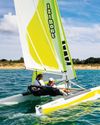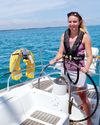
During one of my earliest trips as a professional sailor a wise old skipper gave me some advice at watch change. Watch the green ones, they'll rush for the leeward rail and if they aren't clipped on there's a strong chance they'll go over," he said.
"And what's more, they won't care if they do."
I gulped and looked at my crew. Their faces resembled a Farrow and Ball paint chart: lichen green, skimmed milk white and ash grey. We were en route to Cherbourg from the Solent. By the time we got to the shipping lanes I only had one crew member left on the deck, the rest were in their bunks.
Inglorious and debilitating as it is, the green monster of seasickness strikes indiscriminately. I know several experienced skippers who resign themselves to a diet of bread and water for the first 48 hours of every offshore passage, while some complete novices get off scot-free.
Even round the world sailors like Chris Nicholson and Tracy Edwards are sufferers, while Admiral Lord Nelson himself admitted that: "I am ill every time it blows hard and nothing but my enthusiastic love for the profession keeps me one hour at sea."
The reality is that we all have a wave with our name on it, so we'd better have a decent plan for when the time comes.
Why do people get seasick?
Seasickness is caused by the confusion between different parts of your balance mechanism. Your inner ear is a network of fluid-filled channels sensitive to gravity and motion, called the vestibular system.
Normally the information sent from here to the brain corresponds with the signals coming from the other senses such as vision. On a boat, things stop adding up: according to our eyes we're stationary relative to our immediate surroundings, yet the vestibular system is registering constant motion.
Esta historia es de la edición June 2023 de Practical Boat Owner.
Comience su prueba gratuita de Magzter GOLD de 7 días para acceder a miles de historias premium seleccionadas y a más de 9,000 revistas y periódicos.
Ya eres suscriptor ? Conectar
Esta historia es de la edición June 2023 de Practical Boat Owner.
Comience su prueba gratuita de Magzter GOLD de 7 días para acceder a miles de historias premium seleccionadas y a más de 9,000 revistas y periódicos.
Ya eres suscriptor? Conectar

Orca sink yacht in Strait of Gibraltar
Spain's maritime rescue service, Salvamento Maritimo, has reported that a 15m (49ft) yacht sank in Moroccan waters in the Strait of Gibraltar following interaction with a pod of orca.

No kill cord or lifejackets were worn during fatal powerboat crash
A kill cord and lifejacket are useless unless worn-that's the warning from the Marine Accident Investigation Branch (MAIB), following its investigation into a powerboat crash that killed a 32-year-old woman and five-year-old girl on 2 October 2022.

Multihull sail work
Brush up on multihull sailing skills before heading off on charter with Gavin Le Sueur's guide to spinnaker handling, tacking and gybing

Five top causes of engine failure and how to prevent them
Jake Kavanagh talks to Sea Start marine engineer Nick Eales about how to avoid the five major causes of an engine breakdown at sea

Sail the Atlantic with strangers
Would you sail across the Atlantic with someone you've just met? Ali Wood meets the cruising crews who've done just that

IZIBoat: simple sailing
Rupert Holmes sails an innovative catamaran design intended to widen participation in sailing among those with little time to get on the water in more conventional craft

30 WAYS TO GET AFLOAT
From tall ships to small dinghies, you needn't own a boat to sail. Ali Wood looks at the options, and how skippers can also find crew

Boats for restoring under £20,000
Duncan Kent picks the best sub-35ft sail and power boats to look for when aiming to undertake a restoration on a budget

Seaworthy dinghies for less than £500
For low cost traditionally-styled GRP trailer-sailers, consider the Foreland and the Otter available at bargain basement prices

Playing with coloured sails
Maintaining an hourglass-shaped balloon and ratcheting up the log numbers